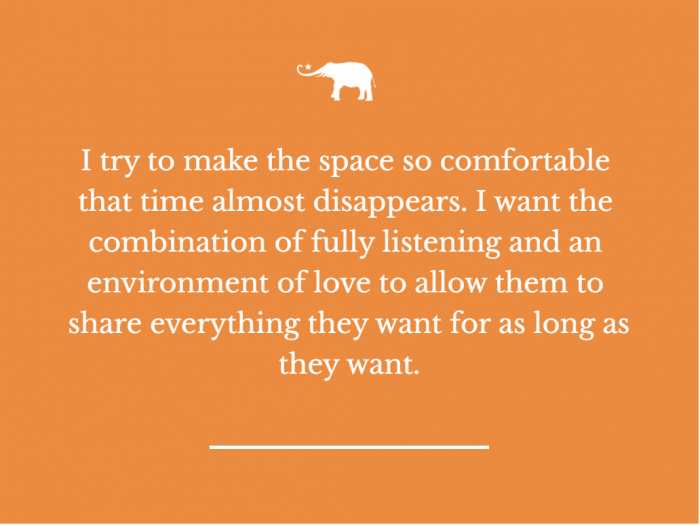I’ve had my fair share of ineffective conversations.
Sometimes I know the person isn’t fully listening and wants me to finish talking as quickly as possible. They pull out their phone or start to offer advice as I’m mid-thought. At best, I’m the lucky recipient of unfruitful advice, and at worst, I become the victim of dismissive, even contemptuous lectures.
When I start talking about one of the many streams of thoughts swimming in my mind, I send out a hopeful plea to the universe that I’ll be met with someone who supports me by holding space rather than suffer from an ineffective conversation.
Holding space involves being physically, mentally, emotionally, and spiritually present with that person as they share their thoughts, fears, and hopes about their situation. It includes putting aside judgement and our desire to fix their issues; instead, we purely listen and offer them love with our whole being.
Holding space is not a new concept.
It’s a common practice in helping professions used by therapists, social workers, caregivers, and life coaches. When offered effectively, holding space becomes the best support. It is a quality that creates effective supervisors, great friends, caring partners, loving siblings, and compassionate parents.
It is accessible for anyone trying to build a connection with another person.
To hold space and truly support someone, we have to fully listen first. I not only hear their words, but I listen to understand them and the emotions underlying those words. I let pauses blossom instead of filling empty space.
I may ask some questions to clarify what I think is being said, which helps provide clarity to the other person and the thoughts and feelings they are experiencing.
I’m focused on them and not concerned with my own worries.
Fully listening while holding space creates a physical environment filled with kind and loving energy.
To create loving energy, I set aside my ego. I am careful not to project my past experiences. I never offer solutions or advice unless the person specifically says, “I would really like your advice on this situation.” Even then, I share thoughts guided by love, warmth, and kindness. I may ask a question that prompts them to think of a different solution rather than offering advice.
How I speak also matters both when creating a space of love and fully listening.
The tone of my voice softens and remains calm, and the cadence of my words might be a little slower.
If we are in a room together, I sit near the person, with an open body posture. My body posture includes always facing the person, laying my arms on the armrest of the chair or in my lap when I’m not using them to talk, slightly leaning forward, and nodding every once in a while. But I don’t do the latter too often because I don’t want to overly project agreement with my body language.
I try to make the space so comfortable that time almost disappears. I want the combination of fully listening and an environment of love to allow them to share everything they want for as long as they want.
Holding space by listening deeply with love creates the foundation for a safe environment where the person feels comfortable being vulnerable.
Brené Brown defines vulnerability as the “uncertainty, risk, and emotional exposure. But vulnerability is not weakness; it’s our most accurate measure of courage.”
Friends may share thoughts and feelings that have not been spoken aloud before. I let my loved ones speak their truth and accept it as their truth. I’m loyal to them and their words, almost always keeping the conversation private (the exception is when there is risk of harm to themselves or others).
Conversations, inclusive of loyalty and vulnerability, build and strengthen connections and relationships.
We most often hold space for close friends, family members, spouses, and loved ones. These are people whom we engage with repeatedly.
Loyalty grows into trust that isn’t easily broken. Without loyalty, the relationship may crack and even create a schism beyond repair. But when we hold space for those close to us, the relationship continues to grow in love, kindness, and true support.
Recently, my closest friend held space for me.
I’d been ruminating about different thoughts and ideas in my head, even becoming a little anxious about them. We started talking, and because of the trust, loyalty, and deep connection of our relationship, I leaned into vulnerability.
As she sat on the opposite end of my living room couch facing me, she listened intently and asked a few questions. She validated my fear, anxiety, and hope. At first, I thought I had said everything I needed to say. But because she was listening without judgement or offering solutions, I continued talking.
Forty-five minutes later, I had already processed every angle of my situation. I felt accepted. I felt like my challenge was validated, and the space was filled with kindness and love. I felt a huge weight lift off my body. I said, “Wow. I didn’t even realize I had all those thoughts and feelings going on. I can’t believe I talked so long. Thank you. Thank you for listening.”
I was reminded that holding space, inclusive of fully listening and creating an environment of love and loyalty, is the best gift of support anyone can ever give.













Read 5 comments and reply